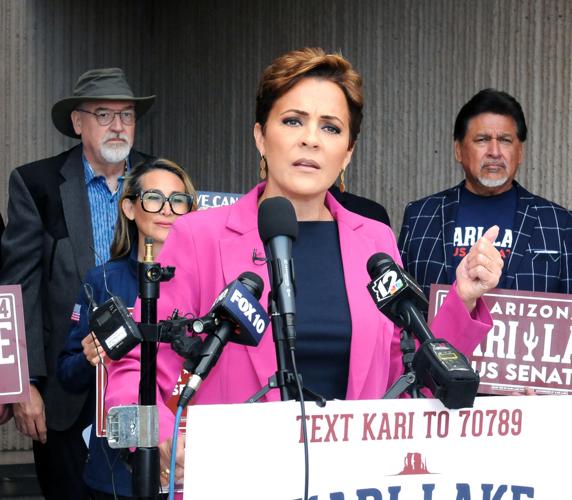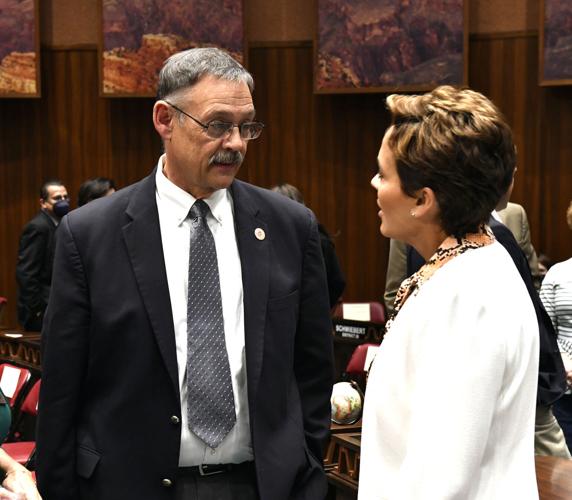PHOENIX — Kari Lake and Mark Finchem want the U.S. Supreme Court to give them a do-over of their losing claim that machines used to tabulate votes in some Arizona counties are so inherently unreliable that they violate their constitutional rights.
In a new legal filing, attorney Lawrence Joseph said his clients now have new evidence that was not known when the pair first filed their claim ahead of the 2022 election, evidence they did not get to present to a federal judge in Arizona.
Under normal circumstances, appellate courts — including the Supreme Court — look only at the record of a case to determine whether the trial was conducted fairly. Anything not in evidence at the time of the trial is legally irrelevant.
But Joseph told the justices there is enough for them to conclude that a new trial, with this new evidence, could result in a different outcome.
Less clear is whether the pair, if they get their new trial, actually hope to overturn the 2022 election that Lake lost for governor and Finchem lost for secretary of state.
In his 38-page filing, Joseph contends that the pair suffered a “procedural injury.”
“Procedural-rights plaintiffs have standing for a ‘do-over’ under the proper procedures and standards, even if the election might produce the same winners,’’ he wrote. “A court could order ‘do-over’ relief (i.e., counting the paper ballots) in the 2022 election as well as similar relief for future elections.’”
Lake, at a news conference Friday, acknowledged that option of rerunning the 2022 election she lost to Democrat Katie Hobbs by 17,117 votes.
“It was run so poorly, you’d think that they would want to do that,” she said. Still, Lake called that a “long shot for any judge to make that ruling.’’
Even if that doesn’t happen, Joseph said, the underlying problems the pair contend exist with the voting tallying machines still remain. And that, he said, affects both of them as Lake now is a Republican candidate for U.S. Senate and Finchem, formerly a GOP state representative from Oro Valley, now hopes to be the state senator from the Prescott area.
“What I want to make sure is that the 2024 election is both safe and secure,’’ Lake said. “I’m looking forward right now.’’
In filing suit ahead of the 2022 race, the pair alleged that the machines are unreliable because they are subject to hacking. And they said the use of components in computers from other countries makes them vulnerable.
They sought to have the 2022 election conducted with paper ballots, which would be counted by hand, calling it “the most effective and presently the only secure election method.’’ But Arizonans already vote on paper ballots; it is only the totals that are tabulated by machines.
U.S. District Court Judge John Tuchi, who rejected their claims before the 2022 vote, did a deep dive into their allegations. And what they amounted to, Tuchi said was a “long chain of hypothetical contingencies’’ — ones that have never occurred in Arizona — that would have to take place for any harm to occur.
Lake and Finchem had no better luck with the 9th Circuit Court of Appeals which concluded last year that the pair never presented any evidence that the machines used in Arizona to count ballots had actually ever been hacked. In fact, the judges noted, the attorney for the failed Republican hopefuls “conceded that their arguments were limited to potential future hacking, and not based on any past harm.’’
Joseph, in the new legal briefs, said that’s no longer the case.
“Newly discovered evidence ... shows Arizona’s Maricopa County flagrantly violated state law for electronic voting systems — including using altered software not certified for use in Arizona — and actively misrepresented and concealed those violations,’’ he told the justices.
“Potentially worse — although potentially unknown to Maricopa — the Dominion Voting Systems Inc. systems used in Maricopa and almost 30 states have a built-in security breach enabling malicious actors to take control of elections, likely without detection,’’ Joseph said.
He also said that Lake and Finchem recently obtained “system log’’ files from the 2020 election. What those show, Joseph said, is that Maricopa County’s election software “has been surreptitiously altered with respect to components controlling how ballots are read and tabulated.’’ And he said that, despite representations to the contrary, the county did not conduct statutorily mandated pre-election logic and accuracy checks prior to the 2020 general election but tested only five spare tabulators.
“Maricopa did the same thing in connection with the November 2022 election,’’ Joseph said.
And then there’s the claim that the Dominion machines used to tabulate ballots are not secure.
“Embedded Dominion employees or any malicious actor who knows where to look can gain total access and control over an election,’’ he told the court. “It is like a bank telling the public they have the most secure vault in the world, and then taping the combination on the wall next to the vault door.’’
What Lake and Finchem want is an opportunity to present all of what they say is new evidence at a new trial. All that, she said, will restore faith in the election system.
“Right now, that’s just not the case,’’ Lake said. But she brushed aside questions of whether that lack of faith is because people like her repeatedly make public pronouncements that the system is flawed.
“I think you need to just open your eyes and start talking to people outside of your newsroom and your bubble, and you’ll understand that,’’ Lake said.
Now the question is whether the justices, who have the benefit of access to the 9th Circuit ruling, find any of that persuasive.
In their ruling last year, the appellate judges cited that “long chain of hypothetical contingencies’’ that trial judge Tuchi said would have to occur in order for the harms claimed by Lake and Finchem to have occurred.
“This is the kind of speculation that stretches the concept of imminence beyond its purpose,’’ the appellate judges said.
They also cited the safeguards in the system, starting with certification of tabulation machines and pre-election “logic and accuracy’’ tests where a set of paper ballots with known total votes is fed through the tabulators and the results compared with what the machines reports.
Then after the election, party representatives select a sample of ballots for a hand recount under the oversight of each county’s elections department, the appellate judges noted. And they said the state’s Elections Procedures Manual requires the hardware from tabulators to be stored in secure locations and sealed with tamper-resistant seals.
Those regulations also say tabulators cannot be connected to the internet or any external networks and may not contain remote access software or any capability to remotely access the system.
The judges also noted that Lake and Finchem, in their complaint about how machine counting is flawed, cited the hand count of ballots in Maricopa County by Cyber Ninjas ordered by Senate President Karen Fann after the 2020 election.
The court pointed out that, however, even that report found “no substantial differences’’ between its hand count and the official totals. In fact, it actually showed that Democrat Joe Biden won by a wider result over Republican Donald Trump than the reported tally.
The judges were no more impressed by arguments by Lake and Finchem that there is a constitutional right to a certain level of accuracy in the Arizona tabulation system.
“That claim plainly fails,’’ the appellate judges said.
“It is the job of democratically elected representatives to weigh the pros and cons of various balloting systems, recognizing that no balloting system is perfect,’’ they said. “Indeed, the possibility of fraud can never be completely eliminated.’’
There was no immediate response from either the Attorney General’s Office, which is representing the state or the Maricopa County Attorney’s Office.
None of this directly affects Lake’s separate — and ongoing — litigation to have state judges overturn her loss to Hobbs for governor or, at the very least, order a new election.
She continues to claim there were issues with the 2022 race, including what she said was the failure of Maricopa County to properly compare the signature on envelopes containing early ballots with those on file. And Lake separately has accused Maricopa County Recorder Stephen Richer of illegally inserting more than 300,000 phony ballots into the system and sabotaging Election Day votes by printing the ballots in the wrong size.
None of these have been accepted by trial judges, with Lake now seeking review — and permission to introduce what she says is new evidence — at the state Court of Appeals.
Richer, meanwhile, has sued Lake for defamation. And a trial judge rejected Lake’s bid to have that lawsuit thrown out.
Finchem, who lost to Secretary of State Adrian Fontes by more than 120,000 votes, has abandoned his appeal after losing at trial court.





